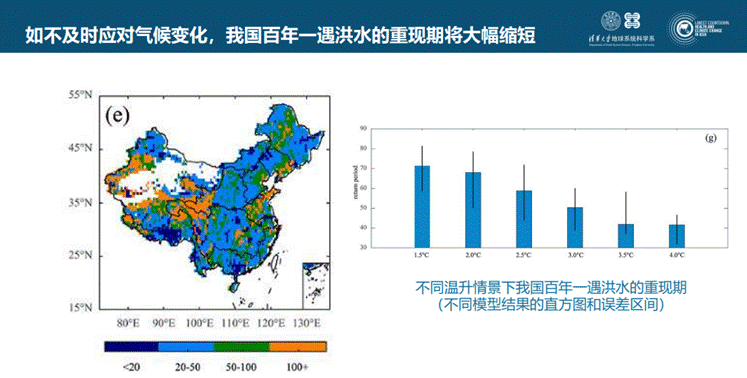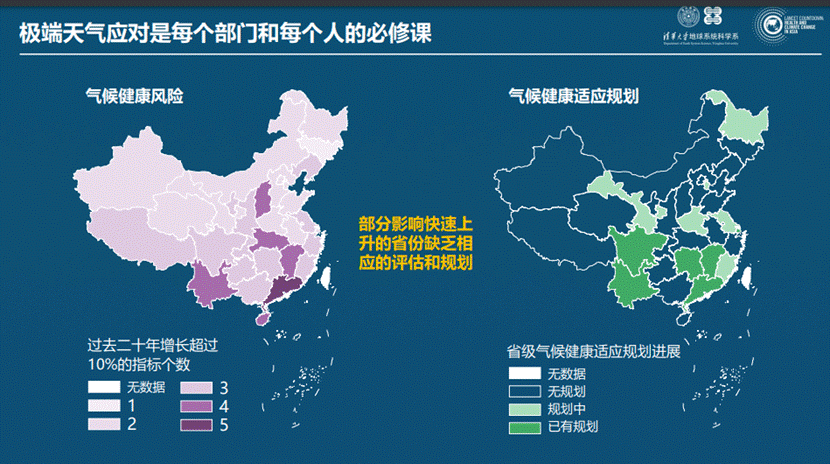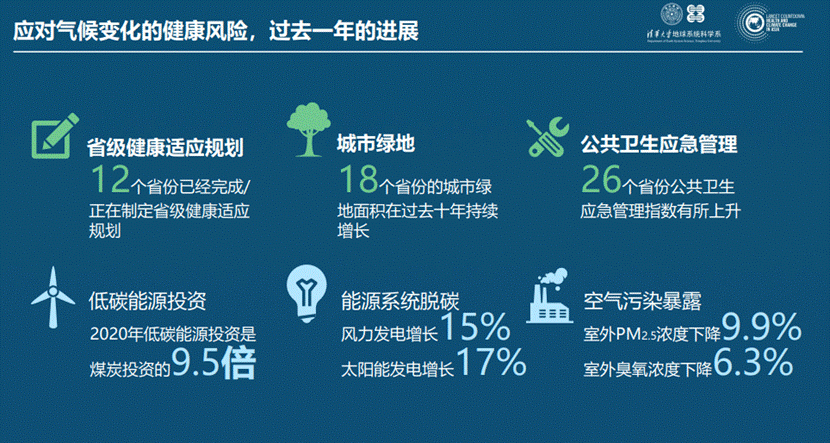Experts: the health threats posed by climate change are increasing.
Source: Xu Tingting and Zhou Xuejin, People's Daily Health Client-side
Recently, Cai Wenjia, a tenured associate professor of the Department of Earth System Science, Tsinghua University and director of the Lancet Countdown Regional Centre for Asia, accepted an exclusive interview with People's Daily Health Client-side. The following is the content of the interview.
People's Daily Health Client-side: What will be the impact of extreme weather events?
Cai Wenjia: The “2021 China report of the Lancet Countdown on health and climate change: seizing the window of opportunity” shows that floods in China occurred more frequently from 2000 to 2019, but the losses caused by floods in 2004 to 2018 showed a downward trend thanks to the improvement of national disaster emergency response capability. However, against the backdrops of climate change, the increasing extreme precipitation events and the resulting floods may reverse the current downward trend of flood disasters. Should no further action be taken in the future, China might become one of the countries most affected by floods in the world.

Judging from the health effects caused by duration, climate change will be with us for decades or even hundreds of years to come. According to the research of the World Health Organization (WHO), about 300,000 people die every year in the world as a result of climate change. The sixth assessment report of the Intergovernmental Panel on Climate Change (IPCC) clearly pointed out that even if human beings successfully control the global temperature rise within 1.5 degrees through emission reduction, the threat of climate change to health will continue to increase in the coming decades.
Climate change affects Chinese people's health from many dimensions, such as heatwaves, floods, droughts and climate-sensitive infectious diseases. However, no "quick-acting medicine" is available for the impact of climate change on health. Despite our current efforts, climate change is likely to intensify in the next few decades, alerting us to make adaptation plans for the future climate environment to prevent the rising health hazards caused by climate change. Meanwhile, we need to change the trend of climate change as soon as possible through emission reduction, so that today's children can enjoy a healthy and safe climate environment by 2100.
People's Daily Health Client-side: How should we deal with extreme weather events from a policy point of view?
Cai Wenjia: China has made significant progress in many aspects of coping with the health hazards of climate change, but there is still room for improvement. Response to extreme weather events is a compulsory course for every department and everyone.

First, we should improve the systematic thinking of relevant departments and further strengthen inter-departmental cooperation. Climate change should be considered one of the main health threats to Chinese residents, for which corresponding countermeasures should be formulated. Health should be included in government departments’ policy formulation and implementation, so as to fully demonstrate the principle of "integrating health into all policies".
Second, we should strengthen the assessment of the impact of climate change on health, and formulate national and local climate health adaptation plans accordingly. In 2022, China included "reducing the health hazards of climate change" as a priority in "Healthy China" Action for the first time, which is of remarkable significance. It is suggested that specific action plans be further defined, especially to actively promote impact assessment and the formulation of adaptation plans at different levels.
Third, it is suggested that China's climate mitigation actions be strengthened to ensure the inclusion of health factors in China's path to carbon neutrality. By promoting investment in zero-carbon technologies and further reducing subsidies for fossil fuels, the current rebound of carbon emissions is expected to be reversed.
Fourth, we should strengthen publicity and raise the awareness of the climate-health relationship among all sectors. Health professionals, academia and the media should be fully united to raise the awareness of the public and policy makers about the important connection between climate change and health. Public support and practice for mitigation and adaptation actions should be enhanced.
People's Daily Health Client-side: How should health and climate change policies be formulated according to local conditions?
Cai Wenjia: Our report has raised a very important point: in face of climate change and health problems in all parts of China, no province can be immune to the impact of climate change on human health, but the specific threats of climate change to each province vary.

Each region in China faces its specific health threats, depending on its local environmental and socioeconomic conditions.
The most concerning trends are the rising heat-related mortality, labour loss, and dengue risk in Guangdong province; flood and drought risks in Sichuan province; and wildfire exposures in Liaoning and Jilin provinces. Developing tailored policies according to these threats is essential to improve the efficiency and effectiveness of climate adaptation responses.
According to our questionnaire survey, among the 30 provinces surveyed from which responses were received, 12 provinces declared that they had completed or were making provincial climate health adaptation plans. Over the past decade, the urban green space area of 18 provincial administrative regions in the Chinese mainland has increased. From 2018 to 2019, almost all provinces improved their public health emergency management capabilities. However, many provinces’ awareness of the health impact of climate change is yet to be developed. We also call on more provinces to address this problem and identify the possible future health hazards as soon as possible.
People's Daily Health Client-side: What measures should be taken to raise public awareness of the linkages between climate and health?
Cai Wenjia: The public pays little attention to the linkages between climate and health. According to our survey in 2020, the queries relating to health and climate change were still seldom co-searched by users—only 3·6 of 1000 climate change queries also had search keywords that were related to health in 2020.
In daily life, many people think that they are healthy as long as they eat well, rest well and feel good, which is an "internal perspective of the human body". We also need an "external perspective of the environment" for the factors affecting health. The external environment, such as heatwaves, cold wave, extreme rainfall and drought, has obvious impact on vulnerable people such as the elderly, children and pregnant women.
In a heatwave, the death risk of the elderly population will be 10% higher than that in other weather conditions, and the incidence of cardiovascular and cerebrovascular diseases and gastrointestinal diseases among vulnerable people and the premature birth rate of pregnant women will also increase accordingly. The World Health Organization's statistical report on the burden of diseases in various countries shows that the number of deaths caused by environmental risk factors in China accounts for about 1/4 to 1/3 of the total number of deaths. Among them, air pollution and climate change, which we are familiar with, have a significant impact.
We should develop a more comprehensive concept of health, with both "internal perspective of the human body" and "external perspective of the environment", as health depends not only on individual efforts, but also on the external environment.